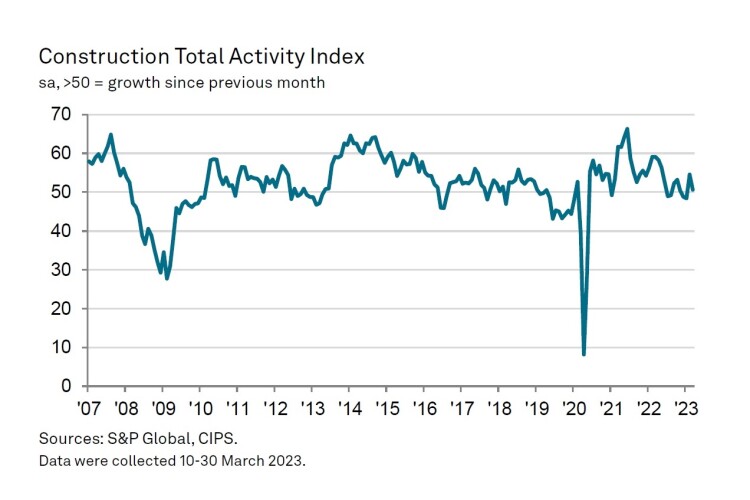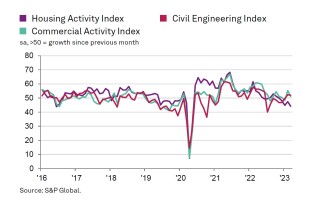While the civil engineering sector is being propped up by HS2, house-building has now been in decline for four consecutive months.
At 50.7 in March, the headline seasonally adjusted S&P Global / CIPS UK Construction Purchasing Managers’ Index (PMI) – which measures month-on-month changes in total industry activity – signalled only a marginal overall increase in total construction output.
It was down from 54.6 in February and heading back towards the 50.0 mark that indicates zero growth.
Civil engineering activity (index at 52.0) was the fastest-growing area of construction output in March. Survey respondents again cited a boost from work on HS2 projects and demand for other transport-related construction activity.
The latest survey also signalled an increase in commercial building work (index at 51.1), although the rate of expansion eased from February's nine-month high. Meanwhile, housing activity decreased at a sharp and accelerated pace in March (scoring 44.2). This rate of decline was the fastest since May 2020. Survey respondents cited fewer tender opportunities due to rising borrowing costs and a subsequent slowdown in new house-building projects.
Despite subdued housing market conditions, latest data signalled a further increase in total new work received by construction companies. This rise was the second-fastest since July 2022. Greater workloads led to an upturn in staff recruitment, with the rate of job creation accelerating to its fastest since last October. That said, some construction firms noted that elevated wage pressures and shortages of available candidates had acted as a constraint on hiring.
Input prices continued to rise sharply in March, with construction companies often noting that suppliers had attributed this to elevated energy costs and rising wages. However, the latest round of cost inflation was the second-slowest since November 2020.
Finally, around 46% of the survey panel predict an increase in business activity during the year ahead, while only 11% foresee a reduction. This is the strongest degree of positive sentiment since February 2022, rebounding strongly from the two-and-a-half year low seen in December, largely reflecting signs of a turnaround in client spending and a more favourable outlook for the wider UK economy.

Tim Moore, economics director at S&P Global Market Intelligence, which compiles the survey, said: "UK construction companies experienced a sustained rebound in output levels during March as work on civil engineering and commercial projects picked up for the second month running. Improved tender opportunities were also reflected in an upturn in new orders since February and the strongest rate of job creation for five months.
"A sharp and accelerated decline in house building was the main area of concern in March. Cutbacks to new residential projects in the wake of subdued demand and rising interest rates contributed to the sharpest fall in housing activity across the construction sector for almost three years.
"Despite worries about the near-term outlook for housing activity, expectations for total construction output during the year ahead were relatively upbeat in March. Growth projections were boosted by the fastest improvement in suppliers' delivery times for more than a decade. Survey respondents often cited improved availability of construction inputs and subsequent hopes that purchasing price inflation would moderate in the months ahead."
John Glen, chief economist at the Chartered Institute of Procurement & Supply, said: “A small uplift in construction activity in March shows the sector is heading in the right direction and at a stabilising pace, and with a few uplifting surprises along the way.
"Delivery times from suppliers improved at the fastest rate since November 2009 as stocks were unravelled and fewer orders from supply chain managers meant goods got through more quickly. Builders were also riding high with the highest levels of optimism since February 2022 and there was an uplift in hiring levels to maintain momentum.
"Strong inflationary pressures remained an obstacle to wider expansion at building companies however along with concerns over consumer affordability rates. With residential building still struggling and falling at the fastest rate since May 2020, it was the bigger projects like HS2 managed by the civil engineering sector that added fuel to the engine of construction growth this month."
Got a story? Email news@theconstructionindex.co.uk




